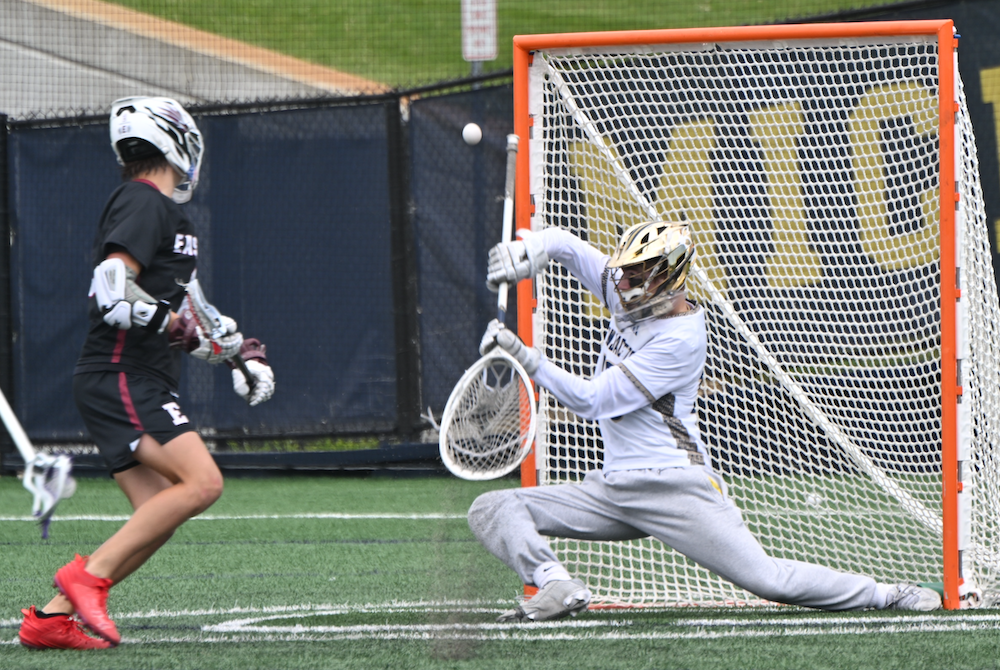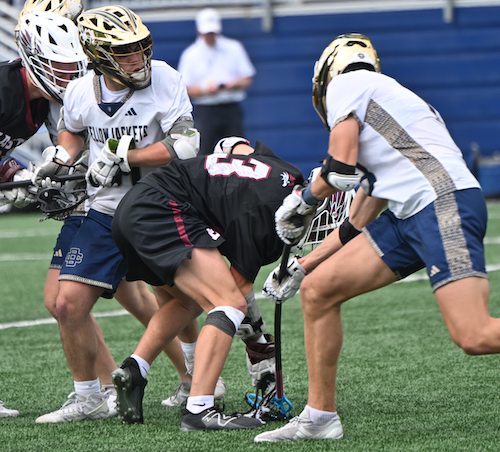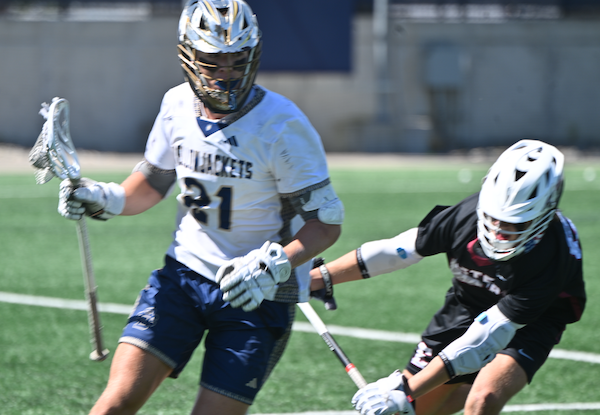
Powerful Voice for High School Sports
December 19, 2014
By Geoff Kimmerly
Second Half editor
Paul Carey was home from the U.S. Army only a few months and just shy of 25 years old when Beal City embarked on its first trip deep into the MHSAA boys basketball tournament.
On the call for local radio station WCEN from gyms at Saginaw Arthur Hill and Lansing Sexton, Carey served as the voice of the previously “laughable” Aggies as they reached the Class D Semifinals before falling just six points short of playing for the title.
“All of Beal City emptied out. They’d never had anything before,” Carey recalled during his annual Thanksgiving weekend visit to the MHSAA Football Finals at Ford Field. “When I got home, within the next two weeks I got a letter from every citizen of Beal City thanking me for broadcasting their games. That’s the kind of appreciation that meant so much.”
During 42 years on the airwaves, Carey was best known as a voice of the Detroit Tigers bounding out of transistor radios all over Michigan, thanks to WJR’s powerful signal.
But for the state’s high school sports community, his legacy is similarly memorable as the voice of the longtime football and basketball scoreboard show and a voter for various all-state teams and wire polls over the decades.
Now 86 and retired since 1991, Carey remains a regular during the first day of the Football Finals, taking in games he broadcast for the MHSAA during the late 1970s and that continue to hold his eye as they have for more than a half-century.
“It was a passion of mine. High school sports always has been,” Carey said. “I think because my dad was a high school coach, and teacher initially, and my brother was a high school coach and teacher, I just grew up in families that appreciated coaching and athletics. I was not a great athlete, but it kept my hand in following sports that way.”
Now, the scores
Carey partnered with Ernie Harwell for Tigers radio broadcasts from 1973-91, including during the march to the 1984 World Series championship. He was named Michigan Sportscaster of the Year six times and to the Michigan Sports Hall of Fame in 1992.
But Carey’s early career included sitting on top of a car, plugged into a phone pole, for a Sacred Heart football game at old Fancher Field just a few blocks from his family’s Mount Pleasant home. Among many more accolades are a Distinguished Service Award from the Michigan High School Coaches Association and a place in the Basketball Coaches Association of Michigan Hall of Fame.
In fact, the start of his weekly announcing of statewide football and basketball scores preceded his baseball career by 16 years and ended two months after he announced his final professional out.
The Michigan High School Scoreboard show was a staple of WJR’s late Friday nights from 1957-91. Carey would read every score he could collect from a variety of sources, often organized by league and with state rankings and context mixed in.
His idea came from something similar read by Len Colby for Kalamazoo’s WKZO. Carey’s brother Terry was coaching at Niles during the second half of the 1950s, and he and other coaches would get together to listen to the Friday night scores from the southwestern part of the state.
Carey, who left WKNX in Saginaw for WJR in 1956, explained to then-sports director Bob Reynolds that the station’s strong signal could provide for a truly statewide scoreboard experience.
Carey then connected with Edgar Hayes of the former Detroit Times, who gave the OK for Carey to call the paper on Friday nights to get scores from the Detroit metro area. For the rest, Carey relied on wire services – there were three at the time – who relied on newspapers from all over Michigan to call in scores over the course of an evening.
Before every Friday during high school football season – and later Tuesdays and Fridays during boys basketball season – Carey typed up lists of games based on schedules in the newspaper, with spaces to add scores. More than a few times, Carey raced down a back ramp at Tiger Stadium after a Friday night game, back to the WJR studio, with 15 minutes to prep for the show’s 11:30 p.m. start.
“If the Flint Journal, the Grand Rapids Press, the Traverse City paper didn’t call in scores to the AP, then I was out of luck too. And that happened all the time,” Carey said. “I would call back occasionally, say, ‘Did you get anything more?’ It was a rat race.”
The show originally was set for 10 minutes and then extended to 15. American Airlines sponsored a record show that followed, and Carey’s scoreboard show had a sponsor only once in 35 years. Finishing up on time was expected, even with more than 200 scores to read.
But Carey said he always went 20 minutes, sometimes 25.
“Because I wasn’t done. I just kept right on going,” Carey said. “Jay Roberts did the all-night show most of the time, and he was patient with me. He didn’t say too much on the air about ‘that guy ahead of me took all of my time.’”
Carey continued the “rat race” until his final scoreboard show, Dec. 20, 1991. He retired from WJR at the end of that calendar year. And it's important to note: Carey was never paid a dime extra for doing the program. .
“I think Paul is really just a sports fan, and that came across to the listener on his broadcasts,” MHSAA historian Ron Pesch said. “Paul would gather as much as possible off the wire. He'd interject if scores were missing from sections of the state. Press polls from the Free Press, News, AP and UPI were big, so he could point out close calls and upsets.
“He provided immediacy, or the closest thing to it in the days before cable TV and the Internet, and because of his scoreboard show, you could get the results before the morning paper. For listeners, he brought life to something as simple as game scores.”
First team all the way
Carey, who resides in Rochester, also served as the engineer on Tigers broadcasts for 16 years, through 1990. He broadcast Pistons games on the radio for six seasons and did the first broadcast of a Central Michigan University football game, in 1949.
Harry Atkins, covering Detroit’s teams while with The Associated Press for 29 years including the last 21 as its sports editor for Detroit, took note of his colleague's hard work – and especially that Carey was one of few broadcasters who was a journalist in addition to a voice.
That made Carey's other major role in high school sports a natural fit.
Atkins split The Associated Press all-state selection panels for football and basketball into 11 regions, and Carey represented the Detroit area for a number of years. He also was a longtime voter in those sports' weekly polls.
“Paul is just that kind of guy. He thought it was important and he made time in his busy schedule to do it,” Atkins said “And it had an impact on the other 10 voters on the All-State panels, too.
“Some of them were from small out-state newspapers or radio or TV stations. Yet every one of them knew who Paul Carey was. And when he spoke, of course, with what often is called "The Voice of God," those voters paid attention.”
And he still does, as well.
At the end of each fall, Carey still puts together a compilation of the three high school all-state football teams – Associated Press, Detroit Free Press and Detroit News – and files them with years of research and results.
“It’s important to me. Nobody sees it but me, but I get a certain kick,” Carey said. “Once in a while I’ll see a kid playing at Central, Western or (Michigan) State or Michigan, and they’ll say he came from Clawson. I’ll go into my all-state collections, say that would’ve been 2009 he played, and I find a name.”
In addition to the Football Finals on WJR, Carey was part of the Baseball Finals broadcasts into the early 1990s, continuing to contribute even after his retirement from his fulltime gig.
He spent high school games over the years sitting next to legends like the Free Press’ Hal Schram and remembers when current Free Press longtime scribe Mick McCabe was just a rookie. One of Carey's final broadcasts was a 1992 Baseball Final with his nephew Mike Carey, who continues to broadcast MHSAA championship games to this day.
“I am eternally grateful to Paul Carey. His contribution to high school sports in Michigan has been great and significant,” Atkins said.
“We are lucky to have him.”
PHOTO: Paul Carey (left) and nephew Mike Carey broadcast the MHSAA 1992 Class D Baseball Final between Hillman and Athens for PASS.

Country Day Scores in Record-Setting Fashion to Claim 1st Title Since 2014
By
Drew Ellis
Special for MHSAA.com
June 8, 2024
ANN ARBOR – Heading into Saturday’s MHSAA Division 2 Final, Detroit Country Day coach Chris Garland attributed a lack of offense to why his Yellowjackets came up short in the 2022 and 2023 championship games.
That issue was corrected this time around.
Detroit Country Day put up the second-most goals in D2 Finals history, defeating Ada Forest Hills Eastern 18-7 to claim its first championship since 2014 and fourth overall.
“We have so many skilled players. We are a complete team with tremendous depth,” Garland said of the offense. “We just want to keep putting the ball in the hands of our offense. If you stop one of them, we have another guy that can come at you. We showed that (Saturday).”
One player that Forest Hills Eastern didn’t have an answer for was Country Day sophomore Keaton Yearego. He matched a MHSAA Finals record with six goals, three coming during a 5-0 rally in the second period that put the Yellowjackets ahead for good at 8-4.
 “I have a lot of confidence in my team, and my coaches have a lot of confidence in me and allow me to play my game,” Yearego said. “I have some great senior attackmen around me that help me do my thing. Today was just my day.”
“I have a lot of confidence in my team, and my coaches have a lot of confidence in me and allow me to play my game,” Yearego said. “I have some great senior attackmen around me that help me do my thing. Today was just my day.”
The Hawks (16-5) tried to set the tone early, posting the first two goals of the game when junior Jackson Arnold and senior Will Morgan each found the net during the opening minutes.
“I loved the energy. The boys came out to play right from the get-go,” Forest Hills Eastern coach Antonio Boggiano said. “We knew right away that we weren’t happy just getting to this moment. We actually wanted to compete for the championship.”
The Yellowjackets (19-2) didn’t let the early deficit affect them and answered with three straight goals, two coming from senior Oliver Aaron.
“We’ve faced that kind of challenge before. It’s nothing new for us. We’re a resilient team,” Aaron said. “When you have a strong bond with your teammates and can rely on them, you can bounce back from those slow starts.”
The Hawks answered with the last goal of the first period from junior Bradyn Campbell. Senior Preston Hoexum then found the net to open the second to put Forest Hills Eastern up 4-3.
That’s when Country Day got rolling offensively. The Jackets scored 14 of the next 16 goals over 26 minutes of play.
Most of the scores came unassisted, as the Yellowjackets won individual battles to get open looks at the net.
 “We have a lot of offensive threats on our team, so if one way isn’t working, we know we have other options,” Yearego said. “We really just executed well and showcased how many different ways we can score. It was an unbelievable performance.”
“We have a lot of offensive threats on our team, so if one way isn’t working, we know we have other options,” Yearego said. “We really just executed well and showcased how many different ways we can score. It was an unbelievable performance.”
The offensive dominance showed in a 49-22 shot advantage for Country Day. The score could have been even more in favor of DCD, but Hawks goalie Camden Klaes made 15 saves in net.
Morgan and Campbell both finished with two goals to lead Forest Hills Eastern, which made its first Finals appearance since 2021.
“I’m just proud of the boys, just for overall the season we have had,” Boggiano said. “We met in October and said right then and there that we were going for this ring. We came up a little bit short, but I’m just extremely proud of (the team). They overcame a lot of adversity.”
Aaron finished with four goals for Country Day to go with Yearego’s six. Preston Cook, Caden Daley and Rhys Kenney all found the net twice.
PHOTOS (Top) Country Day goalie Kellen Curby makes a save during Saturday’s Division 2 Final. (Middle) Country Day and Forest Hills Eastern players scramble for the ball. (Below) DCD’s Joe Norton (21) works to get into the open.

